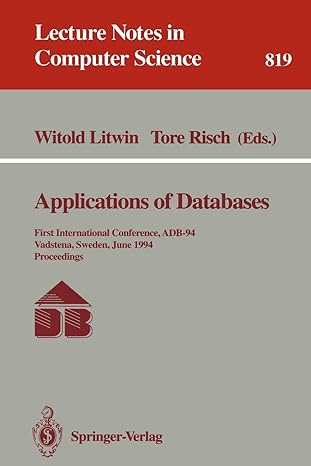Answered step by step
Verified Expert Solution
Question
1 Approved Answer
1 . Scenario: After a multi - year campaign, your customer has decided to move forward with Red Hat OpenShift as their next - generation
Scenario: After a multiyear campaign, your customer has decided to move forward with Red Hat OpenShift as
their nextgeneration application platform. The team is excited and preparing briefings on additional upsell software such as Red Hat Advanced Cluster Security for Kubernetes. The customer also requested a briefing on Ansible Automation Platform and how it may be applicable to Red Hat OpenShift given their existing investments in Ansible Automation Platform.
Question: Select all the potential use cases where Ansible Automation Platform can apply to Red Hat OpenShift environments.
Choose all correct answers
Cloud operations. After installing Red Hat OpenShift, Ansible Automation Platform can perform additional setup and configuration of resources on the cluster. It can also help with infrastructure setup and configuration of the cluster,
such as networks, firewalls, DNS certificate management, and authentication LDAP Ansible Automation Platform enables quick and consistent automation of these tasks in OpenShift deployments.
Lifecycle management. Once a cluster is set up and containerized applications and services are deployed,
Ansible Automation Platform can help manage and operationalize the cluster. It assists in implementing
repeatable and consistent life cycle management automation. Standard procedures and settings can be shared
by customers while others can be modified according to the cluster being targeted, all from one central control plane.
Infrastructure orchestration. Imagine your customer is transitioning to microservices in Red Hat OpenShift. However, these servers need to interact with legacy services and applications. One method of accomplishing this is when the deployment of an application is complete, the customer can create firewall rules that open access between the application and their legacy servicesapplications based on which Red Hat OpenShift worker nodes the application is running from within the Red Hat OpenShift cluster.
Business continuity. When problems happen and things go wrong with mission critical containerized applications deployed to production, your customer needs to maintain business continuity and recover from disasters. With Ansible Automation Platform, they can automate deployments to quickly and accurately recreate environments.
Scenario: Your customers have been using Ansible Automation Platform to automate and patch Linux servers for some time, and you met with the network group to sell the benefits of network automation. There has been zero
interest from the network operations engineers, but after a concerted prospecting effort you have set up a meeting
with the SVP of networking for an executive briefing. The SVP requested a briefing that talks about the potential business value in reducing risk but also about concrete technical use cases that may be a good starting point.
Question: Because you have been working with this customer for years you know they like to start smallsimple Moreover, the engineers in networking are very new to Ansible. What are two obvious use cases that would be good
to target when starting out?
Choose all correct answers
Dynamic documentation readonly fact gathering
Configure backup and restore
Network compliance
Automated NetOps GitOps for network automation
Scenario: One of your customers AWS Cloud team does not believe Ansible has any value for them despite their companys significant investments in Ansible Automation Platform onpremise. However they are open to learning more.
Question: What are the three general targeted categories Ansible is able to assist customers with for their cloud automation use cases?
Choose all correct answers
Governance compliance, infrastructure optimization, business continuity
Operationalize visibility, automated troubleshooting, cloud operations
EventDriven Ansible selfhealing infrastructure
Orchestrate orchestration, migration
Scenario: One of your customers attended AnsibleFest at Red Hat Summit and is interested in deepening their Red Hat relationship after hearing about EventDriven Ansible. They have been using Ansible Automation Platform and are migrating to Ansible Automation Platform which will feature EventDriven Ansible, and are excited to try it
Question: Which potential use cases would you recommend to your customer when getting started with EventDriven Ansible?
Choose all correct answers
Automated remediation
Service ticket enhancement
Linux provisioning and patching
User management
Step by Step Solution
There are 3 Steps involved in it
Step: 1

Get Instant Access to Expert-Tailored Solutions
See step-by-step solutions with expert insights and AI powered tools for academic success
Step: 2

Step: 3

Ace Your Homework with AI
Get the answers you need in no time with our AI-driven, step-by-step assistance
Get Started


